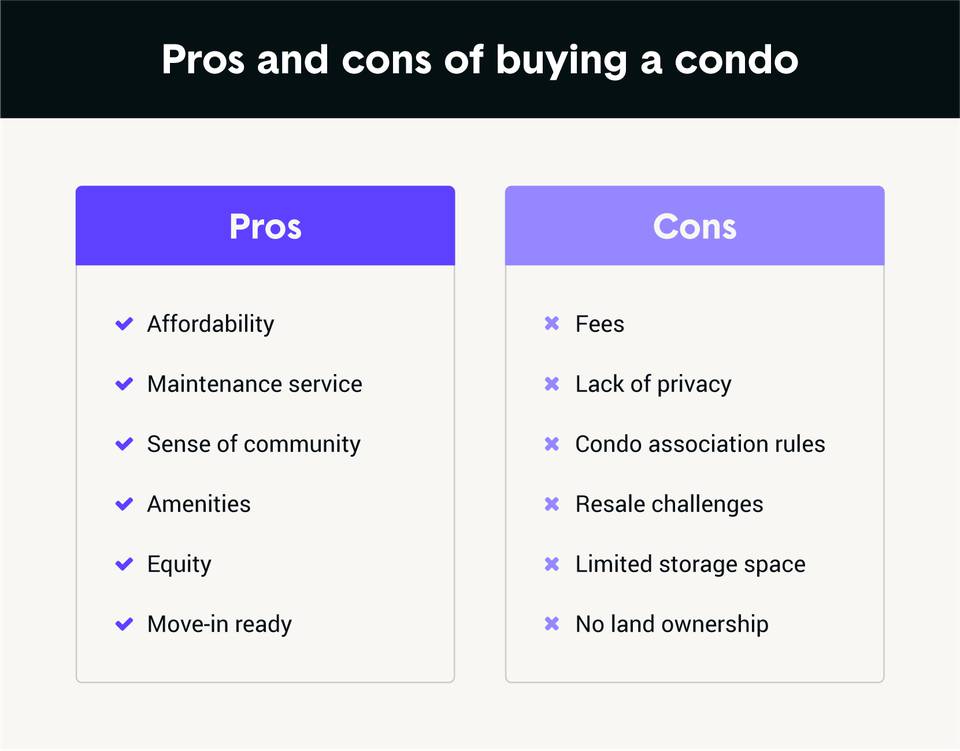The pros of buying a condo
1. Maintenance and repairs off your plate
Condos offer prospective buyers the ability to earn equity like a homeowner without the pressure of maintaining the home's condition or surrounding property. Your condo association will take on the responsibility of shoveling, landscaping, painting or paving any exterior part of the home. Though this does come with a required monthly fee, the benefits may outweigh the cost if you're not interested in upkeep.
2. Luxurious amenities
As a condo owner, you co-own all the shared spaces and amenities offered by building management. From basketball and tennis courts to state-of-the-art gyms and outdoor swimming pools, there are some amazing condo communities out there offering many luxurious amenities that are inaccessible for those purchasing a standard single-family home.
3. Affordability
Buying condo property offers more ownership opportunities to prospective homeowners. Their price difference compared to other types of real estate make them an attractive alternative to look into. You’ll find that condos are typically cheaper to purchase than standard homes. The average price for a condo in 2021 was $289,000 while the cost of a single-family home was $334,500. This added wiggle room in your budget will let you sift through prospective condo properties and strongly weigh your options when it comes to the amenities and guidelines that are most suitable for you.
4. Move-in ready
Some condos can be bought fully furnished. This removes the stress of lugging large pieces of furniture and decor into your new space. And if interior design isn't your forté, you won’t have to worry about going through design layout options that will bring your place to life.
5. Sense of community
Condo owners become part of a larger community once they move into their new homes. With a closer proximity to neighbors, you’ll be able to foster meaningful relationships with surrounding homeowners to potentially become life-long friends. It’s important to keep in mind that not all communities are structured like this, so do your research when looking into potential properties.
6. Security
Condo complexes often provide residents with security features, such as call boxes, 24/7 guard patrol and doorman services. The larger sense of community will also help you feel more relaxed when leaving your home for extended periods of time.
7. Improvements
Unlike an apartment, you fully own your property after you purchase. This gives you free rein to tackle the home improvement projects you want to take on to make the place feel more like you. Paint as many bedrooms and drill as many holes as you’d like. There won't be anyone stopping you!
8. Accessibility
Many condos today are located in different cities full of life and energy. This is great for people looking to explore new restaurants, shopping boutiques and concert events. The close proximity can also make walking an ease, saving tons on transportation expenses like gas and routine maintenance.
These condos are also great for working professionals uninterested in sitting in hours of traffic during their commute. With a home close to a city-based job, you can get to work with less stress and hopefully a smile on your face.
9. Condo associations
There are many benefits to having a condo association. Funded by current residents, this board acts as an overseer when it comes to upholding community rules and regulations. They’ve also taken on the responsibility of making sure you're comfortable in the community you’ve chosen to live in. From preventing large gatherings that’ll keep you up past 12 a.m. to organizing community events, they want every resident to always be happy and comfortable where they live.
10. Equity
If you’re not ready to give up apartment amenities or your sense of community but would like to establish a financial future for yourself, condos can be the right option for you. That’s because condo owners can earn equity on the home they’ve purchased.
Home equity is the total financial portion the homeowners possess after their initial investment and monthly mortgage payments. By contributing on a monthly basis, you have the chance of increasing your property value. This puts more money back into your pocket should you decide to sell.




